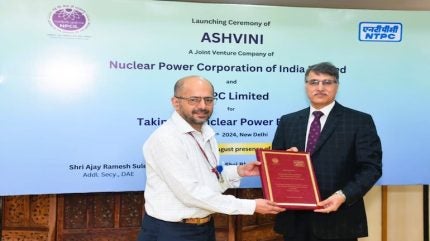
India’s state-owned National Thermal Power Limited (NTPC) has informed the stock exchanges that it has signed a Supplementary Joint Venture Agreement-2 (SJVA-2) with the Nuclear Power Corporation of India Limited (NPCIL). This builds upon an existing Joint Venture Agreement signed in 2010, and represents a strategic restructuring of their joint venture company, Anushakti Vidhyut Nigam Limited (ASHVINI).
The amendments under SJVA-2 change the shareholding structure, with NPCIL now holding a 51% and NTPC retaining 49% in ASHVINI. This reflects a mutual commitment to advancing nuclear energy initiatives in India. The agreement also facilitates the transfer of the Mahi Banswara Rajasthan Atomic Power Project (MBRAPP), comprising four 700 MWe units, from NPCIL to ASHVINIwith the aim of strengthening the operational scope and resource base of the joint venture.
The authorised share capital of ASHVINI has been increased from INR 50m ($578,645) to INR 150m indicating ambitious plans for growth and investment in nuclear energy infrastructure. The agreement also includes a revision in the board composition, with directors nominated by NTPC and NPCIL in proportion to their respective shareholdings, ensuring balanced representation and governance.
NTPC and NPCIL noted that the changes “reaffirm their roles as pivotal players in India’s energy sector, aiming to meet the growing energy demands of the nation while prioritising sustainability and technological advancement”. The restructured joint venture is expected to pave the way for innovative projects and reinforce India’s position in the global nuclear energy landscape.
NPTC has also set up NTPC Parmanu Urja Nigam Limited NPUNL) as a wholly-owned subsidiary “to carry on the business of planning and executing an integrated programme for harnessing and developing nuclear energy for generating electricity or other purposes on a commercial basis” as well as building, owning, operating and managing nuclear plants, promoting research and development, and selecting suitable sites for nuclear power stations and ancillary facilities.
In another development, the outgoing US Administration removed restrictions on three Indian nuclear entities in an attempt to “remove” hurdles for civil nuclear partnership between Indian and US companies. The three entities are Bhabha Atomic Research Centre (BARC), Indira Gandhi Atomic Research Centre (IGCAR) and the Indian Rare Earths (IRE), according to the US Bureau of Industry and Security (BIS). The move is being seen as an attempt by the to facilitate the implementation of the India-US civil nuclear pact that was signed in 2008 but has never been implemented due to differences over liability issues.
In a statement, the BIS said removal of the three entities “will support US foreign policy objectives by reducing barriers to advanced energy cooperation, including joint research and development and science and technology cooperation, towards shared energy security needs and goals.”






